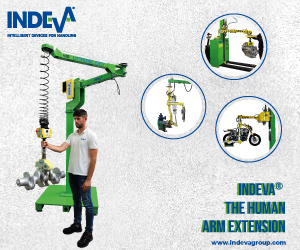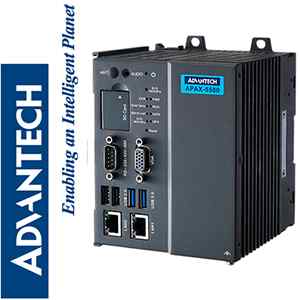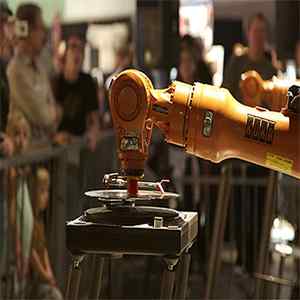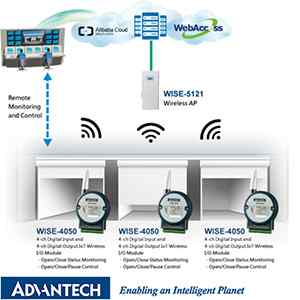Articles
Why is Industrial Automation Important?
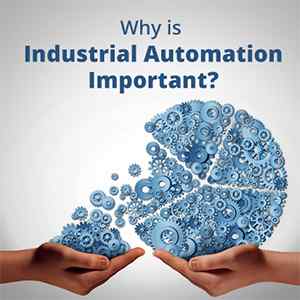
Over the past years, there has been a positive growth in the global industrial automation industry. According to a report, industrial automation market is expected to reach USD 153.83 Billion by 2022, growing at a CAGR of 5.10% between 2017 and 2022. Moreover, usage of automation techniques is on the rise and is expected to continue rising for the foreseeable future.
These expectations showcase that global industrial automation companies are preferring automation to reduce manual labor inputs and decrease costs. It further eliminates the requirement for many low-paying offshore jobs and allows the companies to increase the need for high-skilled activities.
The major advantages of using automation are:
• Reduced direct human labor costs and expenses
• Increased productivity
• Enhanced consistency of processes or product
• Delivery of quality products
Why is industrial automation so important?
The industrial world is facing many technological changes which increased the urgent demand for the premium quality products and services that can only be supplied by a high level of productivity. This requirement needs process engineering systems, automated manufacturing, and industrial automation.
Hence, industrial automation plays a key role in solving the requirements of companies. It is extremely significant to face the tasks of:
Globalization – Global industrial automation market demands superior, practical services
Productivity – Automation companies want to enhance their productivity by producing a higher level of Automation. The key factors include costs, time and quality.
On the other hand, industrial automation is all about working smarter, faster, and proficiently. This makes automation more powerful and that’s why customers are looking for pioneering, end-to-end technologies with open, modern architecture and new data from new connections. As the industrial automation industry comprehends the advantages of the Internet of Things (IoT), it is becoming essential that organizations adopt these technologies.
Industrial Automation Becomes a ‘Solutions’ Business:
Industrial automation is important as it becomes a solution business. Let us check how it becomes a solutions business:
Industrial automation refers the categorization of software and hardware and a mechanism that combines them (hardware & software). Moreover, it involves the process of rolling out new features using advanced technology in business to reduce limitations. Automation can be achieved by installing automated devices or embedded systems as well as automation software performing the logical tasks and control the operation processes.
Implementation of these devices, software, and hardware will be the ‘Solution’ to deliver the operation to be automated. These solutions are widely used nowadays to enhance efficiency and productivity of businesses.
Using Android is not feasible in industrial Automation:
Using Android in industrial automation is not feasible due to various reasons. Here are some of them:
• Future expansion as Android is not modular
• Ruggedness and environmental factors
• Android cannot handle sizable and complex systems
• Not reliable
• You cannot guarantee the safety of the process
Future of Industrial Automation:
Industrial Automation is moving towards exceptional productivity spurred by superior energy efficiency, rigorous safety standards, and better design. Instrumentation and controls have always been a source of new products such as amplifiers, displays, control elements etc.
Automation has been using everywhere nowadays. SCADA, DCS, Process Instruments etc have made automation more reliable and powerful.
Some interesting reads on Industrial automation:
Given below are some handpicked titles that we believe would further your knowledge in automation:
1) Industrial Automation: Hands On By: Frank Lamb
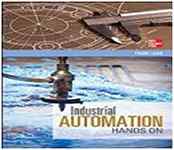
This book titled “Industrial Automation: Hands On” was written by Frank Lamb (McGraw Hill Professional). It is a practical guide to industrial automation concepts, terminology, and applications. It highlights control systems and offers full coverage on machine building, mechanical engineering and devices, manufacturing business systems, and job functions in an industrial environment. This book helps seasoned automation professionals acting as an invaluable reference.
2) Industrial Automation and Process Control By: Jon Stenerson
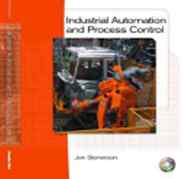
This book “Industrial Automation and Process Control” was written by Jon Stenerson. It covers PLCs, process control, fluid power, sensors, robotics, CNC, Lockout/tag out and safety and so on. It provides knowledge on the main topics in industrial automation and provides a much needed, understandable discussion of process control. It offers a wide array of topics that readers can use this book as a reference for various issues in industrial automation.
3) PLC Programming for Industrial Automation By: Kevin Collins
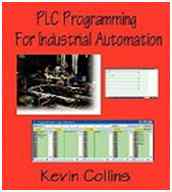
This book titled “PLC Programming for Industrial Automation” is written by Kevin Collins. It provides a basic and comprehensive introduction to the subject of PLC programming for both electrical and mechanical engineering students. This book is easy to follow as it contains many programming examples of reinforce understanding of the programming theory. The author uses the TriLogi PLC simulator which the student can download free of charge from the internet.
|
Also Read: Unlocking the Economics of Industry Automation: Maximizing ROI |
4) Industrial Automation and Robotics: An Introduction By: A.K. Gupta, S.K. Arora, Jean Riescher Westcott
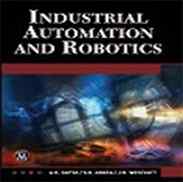
This book titled “Industrial Automation and Robotics: An Introduction” was written by A.K. Gupta, S.K. Arora, Jean Riescher Westcott. The book covers the significant concepts of hydraulics and pneumatics and how they are used for automation in an industrial setting. After that, it contains the discussion of circuits and using them in hydraulic, pneumatic, and fluidic design. The latter part of the book deals with electric and electronic controls in automation and final chapters are devoted to robotics, robotic programming, and applications of robotics in industry.
5) The Value of Automation: The Best Investment an Industrial Company Can Make By: Peter G. Martin
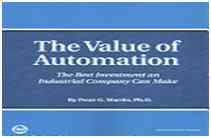
This book titled “The Value of Automation: The Best Investment an Industrial Company Can Make” was written by Peter G. Martin. Industrial automation systems have the potential to be one of the most value-generating vehicles available to industrial companies. Unfortunately, not all managers of industrial companies perceive automation systems that way and few industrial automation systems actually provide the value they could and should.
Images Source: Google Books

